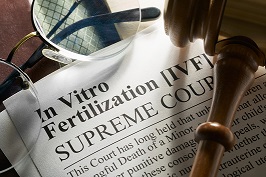In 2019, Alabama voters approved a state constitutional amendment which affirmed the sanctity and rights of unborn children, leading to a near total ban on abortions (unborn, in utero).
In the 2022 Dobbs v Jackson decision, the US Supreme Court ruled that states have a legitimate interest in the preservation and protection of prenatal life at all stages of development. In February 2024, Alabama Supreme Court stated that the “wrongful death of a minor act” extends to children regardless of their location, born or unborn.
The case involved IVF embryos that were destroyed by a clinic customer who gained unauthorized access to the embryos in the IVF laboratory. The parents of the destroyed embryos are seeking punitive damages for the wrongful death of their children. As a result, several fertility clinics in Alabama have paused their IVF treatments for fear of liability.
To say that IVF is used to create life, and is therefore a pro-life medical technology, shows a significant deficit in understanding of the term “pro life”. In IVF, human life is created at the price of destroying other human life.
Several ways that created IVF embryos are destroyed/killed in the process include:
- 7-14 eggs are fertilized per IVF round, with several placed in the womb and the rest frozen indefinitely (1.5 M) or disposed of.
- Pre-implantation screening is conducted to see which of the fertilized eggs are the most healthy, while the rest are destroyed. This is a form of eugenics. Specific genetic testing is conducted if one parent is a carrier of a genetic mutation with a serious disease. Any carrier embryos created are then destroyed.
- Those that do not implant into the uterus are sloughed off and die.
- If too many implant, the excess are reduced (aborted).
- Even if everything goes as planned, the average rate of miscarriage is 20 – 60%, with linear correlation as age increases.
Since 1978, 12 million babies have been born from IVF throughout the world. On average, there is a 10% chance of survival per embryo, meaning a staggering 120 million children have died in the IVF process. This ruling would NOT that mean women will receive sub optimal fertility care. But it does mean they will have to choose between other ethical pathways to pregnancy, for example NaPro Technology, or Adoption.
Postscript: In a short-term fix, the Alabama legislature passed law that protects IVF clinics from lawsuits “for the damage to, or death of an embryo”, just days after the Alabama Supreme Court ruling. However, state senators did not address the legal “personhood” status of IVF embryos.
In conclusion, the foundation of Healthcare Ethics was established by the Belmont Principles, namely Autonomy (Informed Consent), Beneficence (benefit outweighs risks) and Justice (protection of the most vulnerable). Tragically, about 13% of people struggle with infertility and yet desire to be parents. There are several ethical options to gain parenthood, but IVF in its present practice is not one of them. Why? The life, dignity and rights of every human being at each developmental stage must be defended, no matter their location, whether a Petri dish in a laboratory, or inside/outside the womb. Human lives must not be purposely sacrificed to advance other human lives. And every stage of humanity must be guaranteed basic rights of equality and nondiscrimination. IVF breaches all of these ethical principles.
More can be read at the following links:
The Alabama Supreme Court’s Ruling on Frozen Embryos
It’s time to face the ugly truth about in vitro fertilization
